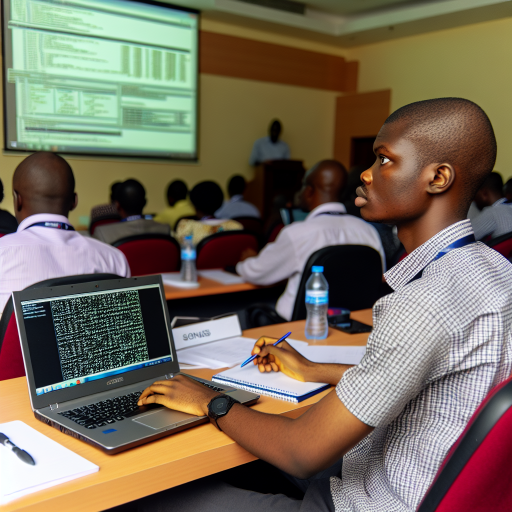Introduction:
Studying applied mathematics in Nigeria comes with its own set of challenges.
Applied mathematics plays a crucial role in fields such as engineering, economics, and technology.
In Nigeria, there is a growing demand for professionals with strong mathematical skills to drive innovation and development.
Lack of Proper Infrastructure:
One of the major challenges students studying Applied Mathematics in Nigeria face is the lack of proper infrastructure.
This includes the inadequate availability of facilities such as libraries, laboratories, and internet access, which are essential for a conducive learning environment.
Without access to well-equipped libraries, students find it difficult to access resources such as textbooks, journals, and research papers that are crucial for their academic work.
This limitation restricts their ability to delve deep into various topics and explore different perspectives in the field of applied mathematics.
Lack of laboratories also poses a significant challenge as students are unable to perform experiments and practical applications of mathematical theories.
This hands-on experience is essential for a comprehensive understanding of the subject and its real-world applications.
Without access to laboratories, students miss out on the opportunity to develop their practical skills and knowledge in applied mathematics.
Moreover, the limited internet access in many educational institutions in Nigeria further exacerbates the challenges faced by students.
In today’s digital age, the internet is a vital tool for research, communication, and accessing up-to-date information.
Without reliable internet connectivity, students struggle to stay updated with the latest developments in the field and are at a disadvantage compared to their peers in countries with better connectivity.
Overall, the lack of proper infrastructure in Nigeria’s educational system presents a significant barrier to effective learning and research in applied mathematics.
Addressing this issue by investing in improving facilities and enhancing resources is crucial to providing students with the necessary support to excel in their studies and contribute meaningfully to the field.
- The inadequacy of facilities such as libraries, laboratories, and internet access.
- The lack of infrastructure hinders practical learning and research in applied mathematics.
- Examples of specific challenges faced by students due to this lack:
Shortage of Qualified Teachers:
Experienced and qualified teachers in applied mathematics are scarce in Nigeria.
This scarcity affects the quality of education and learning outcomes for students.
Students struggle to grasp complex concepts without knowledgeable instructors to guide them.
Qualified teachers bring practical experience and real-world applications to the classroom.
They can provide insights into how mathematics is used in various industries and research fields.
Without competent teachers, students may lose interest and motivation to excel in the subject.
Lack of mentorship and proper guidance can hinder students’ overall academic performance.
Experienced instructors can inspire students to pursue careers in applied mathematics and related fields.
Delve into the Subject: Top Nigerian Universities Offering Applied Zoology Programs
Outdated Curriculum:
The curriculum for applied mathematics in Nigeria is often outdated. It fails to keep pace with the rapidly evolving industry needs. This stagnation in the curriculum can lead to several challenges for students pursuing this field.
- Relevance Gap:
- Lack of Practical Skills:
- Employability Issues:
One of the major implications of studying irrelevant topics in the field of applied mathematics is the relevance gap. As students are taught outdated concepts, they may struggle to apply them in real-world scenarios or industries.
Another challenge that arises from an outdated curriculum is the lack of practical skills. If the curriculum does not cover modern techniques or tools used in the industry, students may graduate without the necessary skills to succeed in their careers.
Studying topics that are no longer relevant in the industry can lead to employability issues for graduates. Employers seek candidates with up-to-date knowledge and skills, which students may lack due to the outdated curriculum.
Ways to Update the Curriculum:
- Industry Collaboration:
- Regular Review:
- Integration of New Technologies:
Collaborating with industry professionals can help in identifying the current trends and requirements in the field. This partnership can ensure that the curriculum is aligned with industry needs.
Conducting regular reviews of the curriculum is essential to ensure that it stays relevant and up-to-date. This process should involve feedback from students, faculty, and industry experts.
Integrating new technologies and tools into the curriculum can enhance students’ learning experience. It prepares them for the demands of the modern workplace. This includes topics such as data science, machine learning, and computational methods.
Addressing the issue of an outdated curriculum in applied mathematics is crucial to mitigating the challenges faced by students in Nigeria. By updating the curriculum through industry collaboration, regular reviews, and the integration of new technologies, students can acquire the relevant skills and knowledge needed to excel in their careers.
Gain More Insights: The Role of Anthropology in Nigerian Development
Limited Career Opportunities:
One of the major challenges in studying applied mathematics in Nigeria is the limited job prospects for graduates.
Many students who pursue a degree in applied mathematics face difficulties in securing relevant employment opportunities.
The lack of career opportunities in the field of applied mathematics can severely impact students’ motivation and interest in the subject.
When students are not able to see a clear path to a successful career after graduation, they may lose enthusiasm for studying the subject.
Effects on Students’ Motivation:
The limited job prospects for applied mathematics graduates can lead to a sense of disillusionment among students.
Students may question the value of investing time and effort in studying a subject that does not offer promising career opportunities.
This lack of motivation can result in decreased academic performance and a disinterest in pursuing further education or specialization in applied mathematics.
Transform Your Career with Expert Guidance
Get personalized mentorship consulting that’s tailored to your unique path. Our expert advice is actionable and exclusive.
Get StartedIndustries with Underutilized Skills:
In Nigeria, there are several industries and sectors that do not fully utilize the skills of applied mathematics professionals.
The banking and finance industry often overlooks the expertise of applied mathematicians in areas such as risk management and predictive modeling.
Similarly, the healthcare sector could benefit from the analytical skills of applied mathematicians in optimizing healthcare processes and resource allocation.
The lack of awareness or understanding of the value that applied mathematics professionals can bring to these industries contributes to the underutilization of their skills.
Overall, the limited career opportunities for graduates with a degree in applied mathematics in Nigeria pose a significant challenge to the growth and development of the field.
It is crucial for policymakers, educators, and industry leaders to collaborate in creating more avenues for employment and recognition of the valuable contributions that applied mathematicians can make in various sectors.
By addressing these challenges, we can empower students to pursue their passion for applied mathematics with confidence and enthusiasm.
Delve into the Subject: Environmental Impact of Ship Building in Nigeria
High Cost of Education:
Studying applied mathematics in Nigeria comes with a significant financial burden.
The cost of tuition fees at universities and colleges can be exorbitant.
Textbooks and other learning resources are often expensive and not easily accessible.
Many students from low-income backgrounds struggle to afford quality education.
These financial challenges can hinder students’ ability to fully engage in their studies.
Some students may have to work part-time jobs to support their education, affecting their academic performance.
The lack of financial support and scholarships further exacerbates the situation for many students.
This financial strain can lead to increased stress and anxiety among students, impacting their overall well-being.
Students may feel discouraged or demotivated due to the financial barriers they face.
Gain More Insights: Animal and Environmental Biology Student Experiences

Negative Perception of Mathematics:
Many Nigerians view mathematics as a difficult and intimidating subject.
This negative mindset can lead to fear, anxiety, and lack of interest in the subject.
Students studying applied mathematics often face challenges due to this stigma.
The perception of mathematics as “hard” can affect students’ confidence levels.
How the Stigma Affects Students:
- Students may shy away from pursuing a career in applied mathematics.
- Low self-esteem and lack of motivation can impact academic performance.
- The stigma can create a barrier to learning and understanding mathematical concepts.
- Students may develop a fixed mindset, believing they are not capable of excelling in mathematics.
Promoting the Importance of Mathematics:
- Introduce real-life applications of mathematics to make it more relatable and engaging.
- Organize workshops and seminars to highlight the significance of mathematics in various fields.
- Encourage students to participate in math-related activities and competitions to boost confidence.
- Provide support and mentoring for students struggling with mathematics to build their skills.
Strategies for Changing Perception:
- Implement interactive teaching methods to make mathematics more interesting and accessible.
- Showcase success stories of individuals who have excelled in applied mathematics to inspire students.
- Collaborate with industry professionals to demonstrate the real-world impact of mathematics.
- Offer scholarships and incentives to encourage students to pursue a career in mathematics.
By addressing the negative perception of mathematics in Nigerian society and promoting its importance, we can create a more supportive and encouraging environment for students studying applied mathematics.
Through targeted strategies and initiatives, we can empower students to overcome their fears and challenges, ultimately allowing them to unleash their full potential in this critical field.
Lack of Support for Research and Innovation:
In Nigeria, one of the significant challenges facing the study of applied mathematics is the lack of support for research and innovation.
The field of applied mathematics thrives on innovation, new ideas, and practical solutions to real-world problems.
Without adequate funding and support for research projects, the growth and advancement of this field are severely hampered.
Currently, in Nigeria, there is limited government funding and institutional support for research initiatives in applied mathematics.
Many mathematicians and researchers struggle to secure funding for their projects, which limits their ability to explore new ideas and develop innovative solutions.
This lack of support not only affects individual researchers but also has a broader impact on the field as a whole.
The consequences of this lack of support are far-reaching.
Without the necessary resources to conduct research, mathematicians in Nigeria may struggle to stay competitive on a global scale.
They may miss out on opportunities to collaborate with international researchers, publish their work in reputable journals, or participate in cutting-edge projects that could benefit society as a whole.
On the other hand, countries like the United States, China, and Japan have thriving research environments in mathematics.
These countries invest significantly in funding research projects, providing grants and scholarships for mathematicians, and establishing collaborations with industry and academia.
As a result, they have been able to produce groundbreaking research and innovations that have had lasting impacts on various fields.
To improve the support for research in mathematics in Nigeria, several strategies can be considered.
First and foremost, the government needs to allocate more funding specifically for math research.
This funding can be used to establish research grants, scholarships, and fellowships for mathematicians at all levels of their career.
By providing financial incentives, the government can encourage more researchers to pursue innovative projects in applied mathematics.
Furthermore, Nigeria can also benefit from collaborating with international organizations and research institutions.
By forming partnerships with established research centers in other countries, Nigerian mathematicians can access new resources, expertise, and funding opportunities.
These collaborations can help in bridging the gap between Nigeria and other countries in terms of research output and impact.
Additionally, industry collaborations can play a crucial role in supporting math research projects.
Companies and organizations in Nigeria can be encouraged to fund research initiatives that have practical applications or relevance to their business operations.
By working closely with industry partners, mathematicians can ensure that their research projects have real-world impact and relevance.
Establishing dedicated research centers for applied mathematics can also be beneficial.
These centers can serve as hubs for collaboration, innovation, and knowledge sharing among mathematicians in Nigeria.
By creating a conducive environment for research, these centers can attract top talent, foster interdisciplinary collaborations, and facilitate the development of cutting-edge solutions to complex problems.
Incentivizing researchers to publish their work in reputable journals can also promote the visibility and impact of Nigerian mathematicians on the global stage.
By rewarding quality publications and encouraging researchers to disseminate their findings widely, the government can help raise the profile of Nigerian mathematicians and their work.
Finally, organizing math conferences, workshops, and seminars can provide opportunities for mathematicians to network, collaborate, and exchange ideas.
These events can serve as platforms for showcasing research, discussing emerging trends, and fostering a sense of community among mathematicians in Nigeria.
By encouraging participation in such events, the government can create a vibrant and dynamic research ecosystem for applied mathematics in the country.
Addressing the lack of support for research and innovation in mathematics is crucial for the growth and development of the field in Nigeria.
By investing in funding, collaborations, incentives, and infrastructure, the government can create an enabling environment for mathematicians to thrive and make meaningful contributions to society.
With the right support systems in place, Nigerian mathematicians can overcome the challenges they face and establish themselves as leaders in the field of applied mathematics.
Summarizing the Challenges
Studying applied mathematics in Nigeria comes with numerous challenges.
From inadequate funding to lack of qualified teachers, students face significant obstacles.
Inadequate study materials and outdated curriculum further hinder the learning process.
Importance of Addressing Issues
It is crucial to address these challenges to improve the quality of education.
By investing in resources and training teachers, students can excel in the field.
Updating curriculum and providing modern study materials will enhance learning outcomes.
Encouraging Advocacy
Readers are encouraged to advocate for change in mathematics education.
Supporting initiatives that promote excellence will benefit future generations.
Together, we can work towards a brighter future in the field of applied mathematics.
Additional Resources
the impact of pure and applied mathematics to the society nigeria as …




